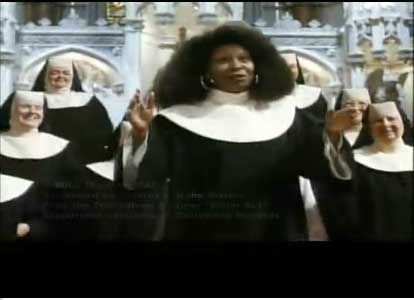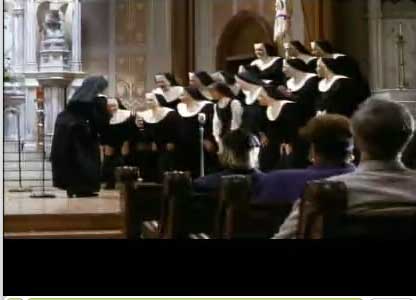 取自电影《修女也疯狂》续集(Sister Act 2)中小女孩Rita Watson和妈妈的谈话。——美国巨星乌比戈登堡(Whoopi Goldberg)扮演的修女玛丽克莱伦斯(Sister Marie Clarence)要组织教会学校的高中生参加全国唱诗比赛。女孩Rita极有音乐天分,由于妈妈认为唱歌不会有出路、不会有前途,坚决反对她参加。
取自电影《修女也疯狂》续集(Sister Act 2)中小女孩Rita Watson和妈妈的谈话。——美国巨星乌比戈登堡(Whoopi Goldberg)扮演的修女玛丽克莱伦斯(Sister Marie Clarence)要组织教会学校的高中生参加全国唱诗比赛。女孩Rita极有音乐天分,由于妈妈认为唱歌不会有出路、不会有前途,坚决反对她参加。
M: Rita, how many times do we have to go through this? Singing does not put food on the table. Singing does not pay the bills. Singing is no guarantee1 to a future, even if you have got talent.
R: Mama, do you know I can sing?
M: So could your daddy, and he died still trying to make it.
 R: What does that have to do with me? Mom, we're a good choir2. They wanna take us to this all-state music competition. We could win.
R: What does that have to do with me? Mom, we're a good choir2. They wanna take us to this all-state music competition. We could win.
M: If you want to win in life, then you keep your nose in them and out of the clouds.
R: If you could just listen to me, let me explain……
M: Baby, I know how you feel. But there are a lot of talented people right down on the street, singing their “shoulda-coulda-wouldas”. Is that how you wanna end up?
R: No. That’s not what I want.
M: Good. Then you don't have time for any choir, cause you gotta study.
R: We have a chance of winning3.
M: The choir and the competition are out.
R: But Mama……
M: If you “But Mama”me one more time, I would let you out. Now I said the choir and the competition are out. You understand?
重点讲解
妈妈回家以后看到丽塔在听音乐,有些不耐烦地说,这件事已经讨论过多少次了。词组go through,原来意是仔细检查,这里用来说一件事情已经过了许多次。下面是妈妈用一连串排比句说明,唱歌是怎样一件没有出路的事。都是生活中的现实:唱歌不能换吃的,不能付帐单,不能保证有光明的前途,即使你是个很有天分的人。
丽塔用了几个理由求妈妈:她很有天分(can)、他们组织的唱诗班可能会赢得全国比赛(all-state music competition)。妈妈毫不客气地打断了她,妈妈说,如果你想在活生生的现实中成为强者(to win in life),就不要学穷困潦倒在街上的歌者,唱着“应该-可能-但愿”(shoulda-coulda-wouldas)的那些人。这里用的都是省略语,使用的是情态助动词加尾音。
“难道你就想这样结束么?”(how you wanna end up?)是妈妈威胁丽塔的话。词组end up with,意思是,以某种方式结束、告终,用作疑问句,用表示方式的疑问词how带起,省略了with。
最后一种需要注意的表达方式是be out。妈妈说,唱诗班和比赛都出局了,想都不能再想了(The choir and the competition are out.),就用的是这种表达。
 收听单词发音
收听单词发音 
 取自电影《修女也疯狂》续集(Sister Act 2)中小女孩Rita Watson和妈妈的谈话。——美国巨星乌比戈登堡(Whoopi Goldberg)扮演的修女玛丽克莱伦斯(Sister Marie Clarence)要组织教会学校的高中生参加全国唱诗比赛。女孩Rita极有音乐天分,由于妈妈认为唱歌不会有出路、不会有前途,坚决反对她参加。
取自电影《修女也疯狂》续集(Sister Act 2)中小女孩Rita Watson和妈妈的谈话。——美国巨星乌比戈登堡(Whoopi Goldberg)扮演的修女玛丽克莱伦斯(Sister Marie Clarence)要组织教会学校的高中生参加全国唱诗比赛。女孩Rita极有音乐天分,由于妈妈认为唱歌不会有出路、不会有前途,坚决反对她参加。 R: What does that have to do with me? Mom, we're a good
R: What does that have to do with me? Mom, we're a good 

